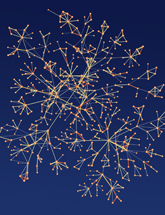Departments in brief
- Department of Applied Physics
- Department of Computer Science
- Department of Industrial Engineering and Management
- Department of Mathematics and Systems Analysis
- Department of Neuroscience and Biomedical Engineering
Separate institute
Department of Applied Physics

The Department of Applied Physics' activity is focused on condensed-matter and materials physics, on quantum physics and nano-optics, and on advanced energy sciences. It has strong traditions in experimental as well as in computational and theoretical physics research.
In the beginning of 2015 the Low Temperature Laboratory (LTL) at the O.V. Lounasmaa Laboratory merged with the Department of Applied Physics. The research and education of the Low Temperature Laboratory are centred on physics from 1 Kelvin down to the very lowest temperatures.
Department Applied Physics hosts three Finnish Centers of Excellence, one in Low Temperature Quantum Phenomena and Devices, LTQ, another in Computational Nanoscience, COMP, and third in Molecular Engineering of Biosynthetic Hybrid Materials, HYBER.
National Low Temperature Laboratory and Nanomicroscopy Center equipped with state-of-the-art apparatus for low-temperature physics, quantum and nano electronics, cryotechnologies and nano materials measurements and characterisation are hosted by the Department.
Department of Computer Science

The Department of Computer Science (CS) provides world-class research and education in modern computer science to foster future science, engineering and society. The work combines fundamental research with innovative applications.
The Department of Computer Science is the largest department at Aalto University and the largest CS unit in Finland with 43 professors and more than 400 employees. The department is part of the School of Science in Aalto University, located in the Otaniemi campus.
The department is known for its innovative and consistently high-quality work matching the very best teams in the world, and is a coveted partner in international collaborations. Research at the department addresses and solves challenging problems of high practical relevance with revolutionary applications.
Computer Science at Aalto was ranked 20th in Europe and 83rd worldwide by the annual U.S. News & World Report survey. This is the only area of technology or exact sciences in Finland within the global TOP-100.
The department hosts three national Centres of Excellence: the Center of Excellence in Computational Inference Research (COIN) and parts of the Centers of Excellence in Molecular Systems Immunology and Physiology Research (SyMMyS) and Research on Solar Long-Term Variability and Effects (ReSoLVE). The department also contributes to the Helsinki node of EIT Digital.
In the beginning of the year 2016 the joint research institute of Aalto University and the Helsinki Institute for Information Technology HIIT and Department of Computer Science merged. HIIT's research ranges from fundamental methods and technologies to novel applications and their impact on people and society.
The new Computer Science Department started to act in January 1, 2015. Department of Computer Science website, the Helsinki Institute for Information Technology HIIT website.
Department of Industrial Engineering and Management

The Department of Industrial Engineering and Management (DIEM) combines technological, economic, and organisational knowledge in order to support value-creating processes and successful business. The research focuses on the creation and transformation of technology-based business. This is examined from three complementary perspectives, i.e. strategy, operations, and people. The Innovation and Technology (BIT) research unit, hosted by DIEM, has over twenty years' of experience in highly multidisciplinary research and it has outstanding societal impact. Department on Industrial Engineering and Management website
Department of Mathematics and Systems Analysis

The Department of Mathematics and Systems Analysis' focal areas are mathematical analysis, numerical analysis, stochastic analysis, and systems and operations research. Department of Mathematics and Systems Analysis website
Department of Neuroscience and Biomedical Engineering

The new Department of Neuroscience and Biomedical Engineering started to act in January 1, 2015. It combimes the former Department of Biomedical Engineering and Computational Science and Brain Research Unit at the O.V. Lounasmaa laboratory.
The Department of Neuroscience and Biomedical Engineering focuses on four key areas: Biomedical Engineering and Biophysics, Computational Complex Systems, Brain and Mind, and noninvasive studies of human brain function. The scale of interest ranges from quantum dots to broad networks. The Department combines experimental and computational methods and develop algorithms, as well as new technologies to tackle major problems in human well-being, medical diagnostics, energy, the society and the environment.
The grand challenges in brain research are in better understanding of the function of both healthy and diseased human brains, studied in both well-controlled and increasingly complex experimental environments, also including social interaction.
EIT Digital

Supported by the European Institute of Innovation & Technology (EIT) the mission is to turn Europe into a global leader in ICT innovations. Education, Research and Business are three elements in the EIT Digital "Knowledge Triangle". Sustainable energy supply, intelligent traffic management and increasing the quality of life are just some of the challenges in the future. EIT Digital aims to create a new breed of innovators and entrepreneurs that can develop breakthrough ideas – supported all the way to the market. EIT Digital website

